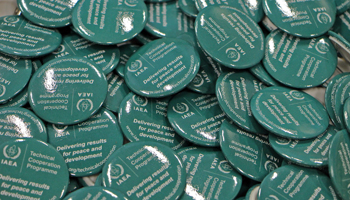This year, the IAEA's Department of Technical Cooperation (TC) held its fifth annual Seminar for Diplomats on 10 October, at the IAEA headquarters in Vienna. Around 30 delegates from 19 permanent missions in Vienna gathered to learn more about the TC programme, from its policy basis to challenges and opportunities in the future.
The seminar provided a complete overview of the TC programme to delegates from Permanent Missions working on IAEA issues, and in particular to new delegates, who have recently joined the Permanent Missions. The all-day seminar was composed of nine distinct sessions presented by high-level staff members from across the IAEA. Thus far, these orientation seminars have been designed such that each successive presentation goes into further detail, and this year was no exception. After Kwaku Aning, IAEA Deputy Director General (DDG) and Head of the Department of Technical Cooperation, welcomed participants, the event began with an overview of the TC programme, the services it provides and how it is managed and implemented, and gradually moved into more specific, core topics.
In order to support policy dialogue between Member States and the IAEA secretariat, the next session presented information on the policy framework of TC, including the key documents that guide the work of the TC programme.
The identification of priority needs of Member States and how these are addressed in the development of TC projects were discussed in the next session. The presentation highlighted key mechanisms to identify and prioritize Member State's needs such as country programme frameworks along with other important planning tools. An overview of the technical departments at the IAEA was also presented with information on the various thematic areas that the IAEA can provide assistance with, such as water resource management and food and agriculture.
The fourth session elaborated on the international development context of the programme, and how it contributes to wider national, regional and interregional development priorities. This was then followed by an overview of the Programme of Action for Cancer Therapy (PACT), which recently moved into the Department of Technical Cooperation, and supports a coordinated global response to the needs of low and middle income IAEA Member States in the implementation of comprehensive national cancer control programmes. Nuclear safety and security was the next topic on the agenda for participants. This provided delegates with an overview of how the IAEA ensures that all TC projects take safety and security into consideration.
During the afternoon, delegates learned more about the TC programme and the roles and responsibilities of the various stakeholders involved with TC projects, the programme cycle and how the programme is financed. Throughout the day each session provided time for delegates to pose question to speakers and IAEA staff on the varied and valuable knowledge they had received.
With the conclusion of the presentations, a formal high-level panel discussion was convened by Mr Aning, who was joined by DDG Alexander Bychkov, Head of the Department of Nuclear Energy, DDG Aldo Malavasi, Head of the Department of Nuclear Sciences and Applications, and Mr James Lyons, Director of the Division of Nuclear Installation Safety, Acting DDG and Head of the Department of Nuclear Safety and Security. The four panellists discussed the challenges and opportunities facing the TC programme today and in the future. With the participating delegates, the panel explored how they might capitalize on those opportunities and overcome those challenges together.
The presentations for each session are available below:
- Session I: An Overview of the Technical Cooperation Programme
- Session II: The Policy Framework
- Session III: Working with Member States to Identify and Address their Needs and Priorities
- Session IV: The International Development Context and the Technical Cooperation Programme
- Session V: The Programme of Action for Cancer Therapy
- Session VI: Nuclear Safety and Security
- Session VII: Programme Roles and Responsibilities
- Session VIII: The Programme Cycle
- Session IX: Financing the Programme
